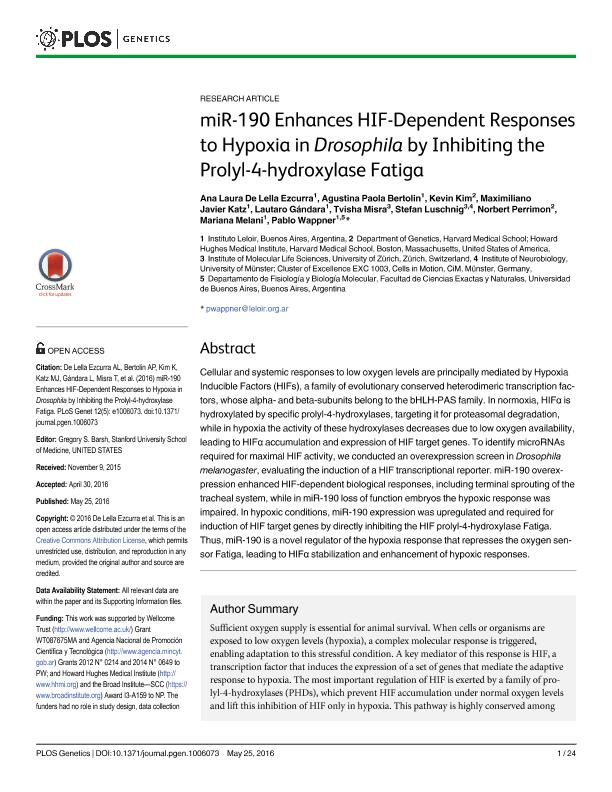Artículo
miR-190 Enhances HIF-Dependent Responses to Hypoxia in Drosophila by Inhibiting the Prolyl-4-hydroxylase Fatiga
de Lella Ezcurra, Ana Laura ; Bertolin, Agustina Paola
; Bertolin, Agustina Paola ; Kim, Kevin; Katz, Maximiliano Javier
; Kim, Kevin; Katz, Maximiliano Javier ; Gándara, Lautaro
; Gándara, Lautaro ; Misra, Tvisha; Luschnig, Stefan; Perrimon, Norbert; Melani, Mariana
; Misra, Tvisha; Luschnig, Stefan; Perrimon, Norbert; Melani, Mariana ; Wappner, Pablo
; Wappner, Pablo
 ; Bertolin, Agustina Paola
; Bertolin, Agustina Paola ; Kim, Kevin; Katz, Maximiliano Javier
; Kim, Kevin; Katz, Maximiliano Javier ; Gándara, Lautaro
; Gándara, Lautaro ; Misra, Tvisha; Luschnig, Stefan; Perrimon, Norbert; Melani, Mariana
; Misra, Tvisha; Luschnig, Stefan; Perrimon, Norbert; Melani, Mariana ; Wappner, Pablo
; Wappner, Pablo
Fecha de publicación:
05/2016
Editorial:
Public Library of Science
Revista:
Plos Genetics
ISSN:
1553-7390
Idioma:
Inglés
Tipo de recurso:
Artículo publicado
Clasificación temática:
Resumen
Cellular and systemic responses to low oxygen levels are principally mediated by Hypoxia Inducible Factors (HIFs), a family of evolutionary conserved heterodimeric transcription factors, whose alpha- and beta-subunits belong to the bHLH-PAS family. In normoxia, HIFα is hydroxylated by specific prolyl-4-hydroxylases, targeting it for proteasomal degradation, while in hypoxia the activity of these hydroxylases decreases due to low oxygen availability, leading to HIFα accumulation and expression of HIF target genes. To identify microRNAs required for maximal HIF activity, we conducted an overexpression screen in Drosophila melanogaster, evaluating the induction of a HIF transcriptional reporter. miR-190 overexpression enhanced HIF-dependent biological responses, including terminal sprouting of the tracheal system, while in miR-190 loss of function embryos the hypoxic response was impaired. In hypoxic conditions, miR-190 expression was upregulated and required for induction of HIF target genes by directly inhibiting the HIF prolyl-4-hydroxylase Fatiga. Thus, miR-190 is a novel regulator of the hypoxia response that represses the oxygen sensor Fatiga, leading to HIFα stabilization and enhancement of hypoxic responses.
Palabras clave:
Hypoxia Inducible Factor
,
Oxygen Sensor
,
Mirna Screen
,
Fruit Fly
Archivos asociados
Licencia
Identificadores
Colecciones
Articulos(IIBBA)
Articulos de INST.DE INVEST.BIOQUIMICAS DE BS.AS(I)
Articulos de INST.DE INVEST.BIOQUIMICAS DE BS.AS(I)
Citación
de Lella Ezcurra, Ana Laura; Bertolin, Agustina Paola; Kim, Kevin; Katz, Maximiliano Javier; Gándara, Lautaro; et al.; miR-190 Enhances HIF-Dependent Responses to Hypoxia in Drosophila by Inhibiting the Prolyl-4-hydroxylase Fatiga; Public Library of Science; Plos Genetics; 12; 5; 5-2016; 1-18; e1006073
Compartir
Altmétricas



